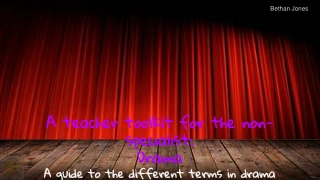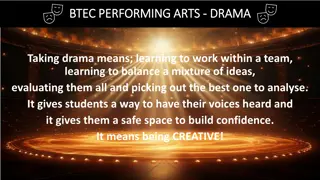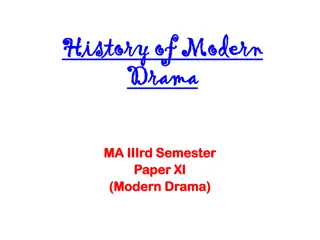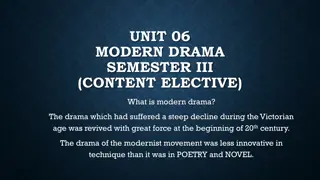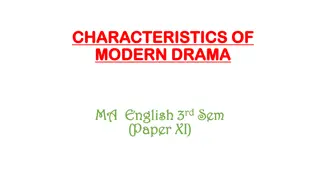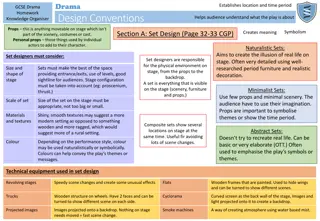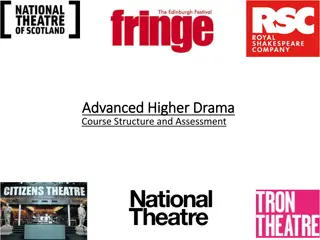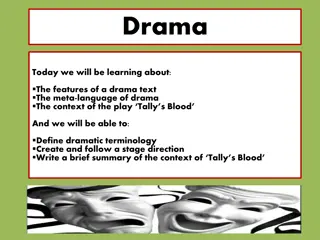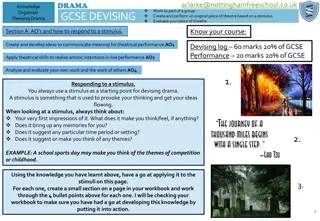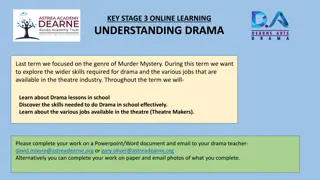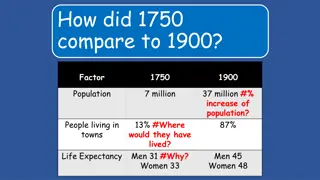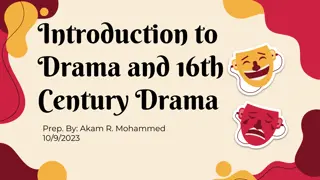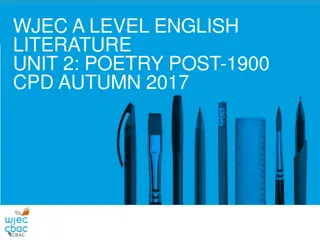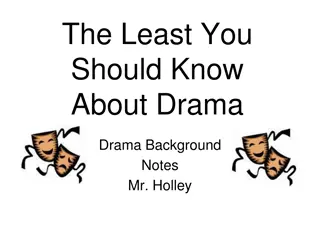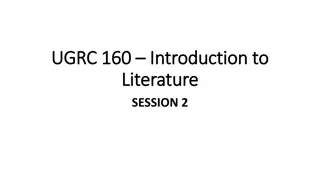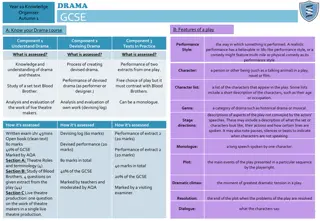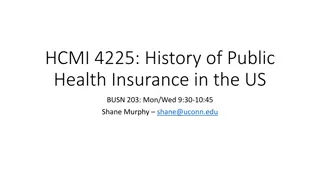Study of Modern Drama and Prose Post-1900
This component focuses on the study of a modern play (The History Boys) and a modern prose text (The Great Gatsby). Learners explore cultural and contextual influences on writers and readers, analyze literary texts, demonstrate understanding of contexts, and make connections across texts. The examination assesses learners' fluency, understanding, and critical responses. Students must articulate personal and creative responses, analyze how writers shape meanings, and explore thematic connections. The Unit focuses on the study of one post-1900 prose text, with a closed-text examination representing 60 marks. Assessment Objectives include evaluating understanding, analysis, and creativity.
Download Presentation

Please find below an Image/Link to download the presentation.
The content on the website is provided AS IS for your information and personal use only. It may not be sold, licensed, or shared on other websites without obtaining consent from the author.If you encounter any issues during the download, it is possible that the publisher has removed the file from their server.
You are allowed to download the files provided on this website for personal or commercial use, subject to the condition that they are used lawfully. All files are the property of their respective owners.
The content on the website is provided AS IS for your information and personal use only. It may not be sold, licensed, or shared on other websites without obtaining consent from the author.
E N D
Presentation Transcript
Introduction HO72 Drama and prose post-1900 (Component 02)
The Texts This component requires learners to study one modern play (The History Boys), which will be assessed in Section 1 of the examination, in addition to one modern prose text (The Great Gatsby), which will be assessed in Section 2.
Section 2 Overview Learners are required to study the whole text. Learners are expected to be able to demonstrate their appreciation of the significance of cultural and contextual influences on writers and readers. This section requires learners to read texts in a variety of ways and be able to respond critically and creatively both to their set text and to an unseen prose passage which will be thematically linked to their set text.
Knowledge, skills and understanding Learners are required to communicate fluently, accurately and effectively their knowledge, understanding and judgement of their set text. Learners are required to understand the significance of cultural and contextual influences on readers and writers. Learners are required to identify and consider how attitudes and values are expressed in their chosen texts. Learners are required to explore connections between their set text and thematically linked unseen extracts.
Learners should be able to: articulate informed, personal and creative responses to literary texts, using associated concepts and terminology, and coherent, accurate written expression demonstrate understanding of the significance and influence of contexts in which their chosen extract was written and received analyse ways in which writers shape meanings in their chosen text explore connections across the texts.
Unit Focus The focus of Section 2 is the study of one post-1900 prose text. Learners answer one question worth 30 marks on the prose text they have studied making connections with a thematically linked unseen prose extract. Answers will be assessed for AO1, AO3, AO2 and AO4.
The Exam It represents 60 marks which is 50% of the marks for AS level. The examination is closed text.
Assessment Objectives Assessment Objective AO1 *** What you need to do Articulate informed, personal and creative responses to literary texts, using associated concepts and terminology, and coherent, accurate written expression. AO2 ** AO3 *** Analyse ways in which meanings are shaped in literary texts. Demonstrate understanding of the significance and influence of the contexts in which literary texts are written and received. Explore connections across literary texts. AO4 * AO5 (Explore literary texts informed by different interpretations.) is not examined in this unit.
Example question: F Scott Fitzgerald: The Great Gatsby Discuss ways in which Fitzgerald presents the rewards and disappointments of pleasure-seeking in The Great Gatsby. In your answer you should make connections and comparisons with the following passage, in which a New York lady s lifestyle is described.
Unseen Prose Extract Tuesday. Joe came barging into my room this morning at practically nine o clock. Couldn t have been more furious. Started to fight, but too dead. Know he said he wouldn t be home to dinner. Absolutely cold all day; couldn t move. Last night couldn t have been more perfect. Ollie and I dined at Thirty-Eight East, absolutely poisonous food, and not one living soul that you d be seen dead with, and Run like a Rabbit was the world s worst. Took Ollie up to the Barlows party and it couldn t have been more attractive couldn t have been more people absolutely stinking. They had those Hungarians in green coats, and Stewie Hunter was leading them with a fork everybody simply died. He had yards of green toilet paper hung around his neck like a lei ; he couldn t have been in better form. Met a really new number , very tall, too marvellous, and one of those people that you can really talk to them. I told him sometimes I get so nauseated I could yip4, and I felt I absolutely had to do something like write or paint. He said why didn t I write or paint. Came home alone; Ollie passed out stiff. Called up the new number three times today to get him to come to dinner and go with me to the opening of Never Say Good Morning , but first he was out and then he was all tied up with his mother. Finally got Ollie Martin. Tried to read a book, but couldn t sit still. Can t decide whether to wear the red lace or the pink with the feathers. Feel too exhausted, but what can you do? Dorothy Parker, From The Diary of a New York Lady (1933) 1 Run like a Rabbit ; Never Say Good Morning : names of Broadway shows 2 lei: a garland of flowers 3 a really new number: a new young man on the social scene 4 yip: retch
The Lessons Each lesson will include a number of tasks including group and individual work, discussion, reading, writing and presenting. You are expected to take a full and active role in every task. There are a number of independent/flipped tasks set for you to do in your own study time. This is an expectation of the course. You will be expected to carry out wider reading and ensure that you are fully prepared for each lesson by bringing your text, notepaper, pens, highlighters etc. You are expected to keep full notes of each lesson which must be dated and clearly labelled as class work/homework/DITS Failure to complete prep, independent work, wider reading, homework or bring the correct equipment will result in you being asked to leave the class. Assignment submission is via Edmodo only and the deadline is 4pm on the date of submission. Late submissions will not be marked and will receive a U grade. Extensions will only be given if there are mitigating circumstances. Attendance at all lessons is essential. Missed lessons will be reported immediately to the Attendance Officer. You may be asked to leave the course if you do not attend all lessons without mitigating circumstances. Should you miss a lesson, it is your responsibility to catch up on all work before the next lesson. You will find all resources and handouts on my blog. This includes all written tasks. Lateness will not be tolerated. If you arrive late without good reason, you will be asked to leave the class.
What you need to do now Purchase and read The Great Gatsby The Great Gatsby (Wordsworth Classics) Available on Amazon from 0.1p Paperback: 144 pages Publisher: Wordsworth Editions; New edition (5 May 1992) Language: English ISBN-10: 185326041X ISBN-13: 978-1853260414
All work must be neatly filed, clearly dated and labelled with a clear title. Create a folder Your folder will contain: A cover sheet with unit title and details All resources given out in class, dated and highlighted to show you have read with summary notes attached Any marked work printed out and clearly dated DIT tasks clearly labelled and dated Class notes labelled and dated Homework tasks clearly labelled and dated. Your folder will be taken in and reviewed each half term.
Sign up to Edmodo Your group code is: 5m3bxa
Allow one hour to work on your reading log each week Reading Log Set up a reading log Create character profiles and a timeline of events Make notes of your wider reading and keep details of all articles/websites etc. For each chapter do one or more of the following: Write a one sentence summary Write a headline Sum up the chapter in 3 words Choose a single quotation to sum up the chapter Recreate the chapter as a 50 word mini saga Complete the guided questions for each chapter which can be found on my blog. We will regularly check, compare and discuss our journals
Allow 30 minutes to add to our Padlets every week Login to Padlet We will use Padlets to collaborate as we read. This includes sharing questions, quotations and resources. Follow the link on my Blog or use the QR code here. Link to Symbolism Padlet
Context research Visit my Blog: mrsjgibbs.wordpress.com where you will find a selection of websites to help you familiarise yourself with the context of the novel. Make careful notes from each resource
Wider Reading John Keats: Ode To A Nightingale (1819) Romantic poetic style influences Fitzgerald Ford Maddox Ford: The Good Soldier (1915) First person narrator is a good comparison with Nick Carraway. T.S Eliot: The Wasteland (1922) Modernist poem, published in the year Gatsby is set. Ernest Hemmingway: The Sun Also Rises (1926) A good stylistic contrast. Anything by Jean Rhys! Truman Capote: Breakfast at Tiffany s (1958) a first person narrative of a partying, superficial society. Richard Yates: Revolutionary Road (1961) set in 1950s America, a tale of failed dreams and harsh realities.
A Level Mindset Over the year, you will complete a number of activities to help you to develop commitment, motivation and productivity. Please complete the 20 questions vision activity on Edmodo at home.
Your 21st Birthday Imagine it is your 21st birthday. At this party, your friends and family will stand up and describe the type of person that you are for them. Think about the following questions and write down your answers: What would you like your friends to say about you? What qualities would you like them to admire in you? How would you like to be described by your colleagues? When they list your achievements so far, what do you want them to be? When they describe all the things you are still going to do, and the hopes they have for your future, what will they say? By creating a vision of what you would like to be in the future, in different areas of your life, you often reflect the personal values that are most important to you in each of these different areas.





